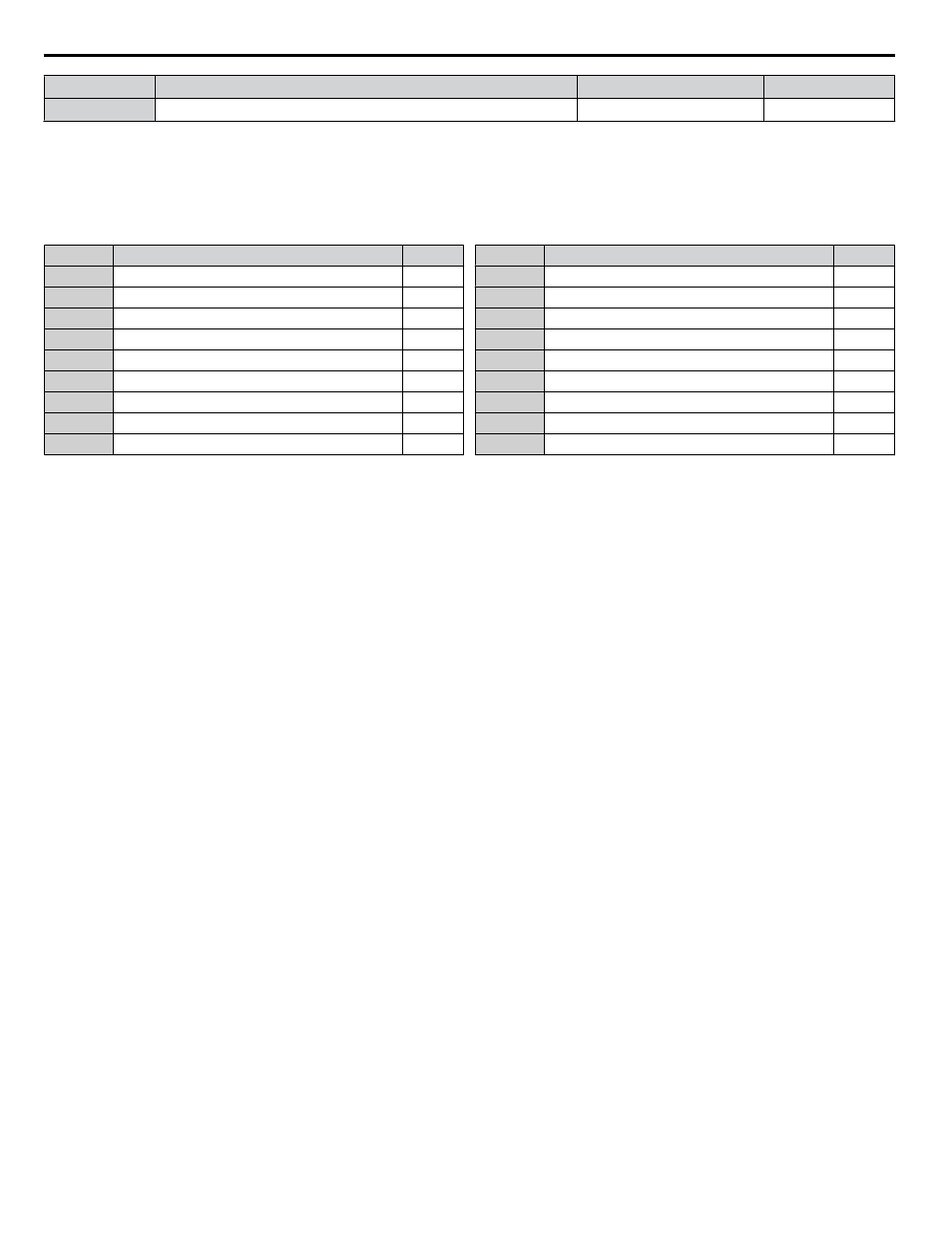Yaskawa Z1000 AC Drive HVAC User Manual
Page 170

No.
Name
Setting Range
Default
H3-10
Terminal A2 Function Selection
0 to 26
0
n
Multi-Function Analog Input Terminal Settings
for information on how H3-02 and H3-10 determine functions for terminals A1 and A2.
Note:
The scaling of all input functions depends on the gain and bias settings for the analog inputs. Set these to appropriate values when selecting
and adjusting analog input functions.
Table 4.38 Multi-Function Analog Input Terminal Settings
Setting
Function
Page
0
Frequency Bias
1
Frequency Gain
2
Auxiliary Frequency Reference 1
3
Auxiliary Frequency Reference 2
4
Output Voltage Bias
–
5
Accel/Decel Time Gain
–
6
DC Injection Braking Current
–
7
Overtorque/Undertorque Detection Level
–
8
Stall Prevention Level During Run
–
Setting
Function
Page
9
Output Frequency Lower Limit Level
–
B
PI Feedback
C
PI Setpoint
D
Frequency Bias
E
Motor Temperature (PTC Input)
F
Through Mode
16
Differential PI Feedback
25
Secondary PI Setpoint
–
26
Secondary PI Feedback
–
Setting 0: Frequency Bias
The input value of an analog input set to this function will be added to the analog frequency reference value. When the frequency
reference is supplied by a different source other than the analog inputs, this function will have no effect. Use this setting also
when only one of the analog inputs is used to supply the frequency reference.
By default, analog inputs A1 and A2 are set for this function. Simultaneously using A1 and A2 increases the frequency reference
by the total of all inputs.
Example: If the analog frequency reference from analog input terminal A1 is 50% and a bias of 20% is applied by analog input
terminal A2, the resulting frequency reference will be 70% of the maximum output frequency.
Setting 1: Frequency Gain
The input value of an analog input set to this function will be multiplied with the analog frequency reference value.
Example: If the analog frequency reference from analog input terminal A1 is 80% and a gain of 50% is applied from analog
input terminal A2, the resulting frequency reference will be 40% of the maximum output frequency.
Setting 2: Auxiliary Reference 1
Sets the auxiliary frequency reference 1 when multi-step speed operation is selected.
Refer to Multi-Step Speed Selection on
Setting 3: Auxiliary Reference 2
Sets the auxiliary frequency reference 2 when multi-step speed operation is selected.
Refer to Multi-Step Speed Selection on
Setting B: PI Feedback
Supplies the PI feedback value. This setting requires PI operation to be enabled in b5-01.
Setting C: PI Setpoint
Supplies the PI setpoint value and makes the frequency reference selected in parameter b1-01 no longer the PI setpoint. PI
operation to be enabled in b5-01 to use this setting.
Setting D: Frequency Bias
The input value of an analog input set to this function will be added to the frequency reference. This function can be used with
any frequency reference source.
Setting E: Motor Temperature
In addition to motor overload fault detection oL1, it is possible to use a PTC (Positive Temperature Coefficient) thermistor
for motor insulation protection.
4.13 Advanced Drive Setup Adjustments
170
YASKAWA ELECTRIC TOEP YAIZ1U 03A YASKAWA AC Drive – Z1000 User Manual